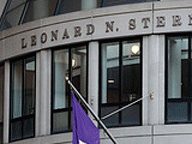Business and Policy Leader Events
—
Stern's Center for Global Economy and Business presents Governor Ewald Nowotny
—

The Stern Center for Global Economy and Business presents Dr. Ewald Nowotny, Governor of the Oesterreichische Nationalbank and Member of the Governing Council of the European Central Bank. Governor Nowotny will discuss “Monetary Issues - The European View.”
Business and Policy Leader Events
—

The Stern Center for Global Economy and Business presents Dr. Ewald Nowotny, Governor of the Oesterreichische Nationalbank and Member of the Governing Council of the European Central Bank. Governor Nowotny will discuss “Monetary Issues - The European View.”



















